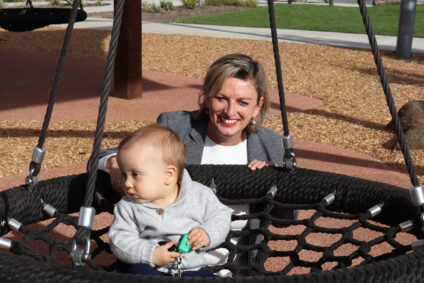Best Start, Best Life: Early Childhood Education That Works
The Andrews Labor Government will deliver an ambitious overhaul of early childhood education and care, with a massive $9 billion investment over the next decade to save families money and support women to return to workforce.
To find a kinder: https://findakinder.educationapps.vic.gov.au/
To find apply as an early childhood educator: https://www.vic.gov.au/early-childhood-teaching
Childcare fees are crippling family budgets, with the typical household spending up to 20% of their income to cover these ever-increasing costs.
The childcare system has been set up to work against working families. While more dads are staying at home with the kids than ever before, it’s still mums who do the lion’s share of childcare.
Because federal childcare subsides go down as household income goes up, many families sit around the kitchen table doing their sums and realise taking on extra days or hours at work just doesn’t add up when childcare costs are weight against the extra wages.
Being a stay-at-home parent is a legitimate choice – but it should be one that’s made based on what works for individual families, not once forced by the limitations of the childcare system.
Plainly, it’s bad for mums and their families. But it’s also bad for our state, as our economy misses out their skills and experience. Lack of access to childcare takes almost 26,600 women entirely out of the workforce in Victoria and costs our economy $1.5 billion per year in lost earnings alone.
That’s why the Andrews Labor Government will expand the Best Start, Best Life program with three major new initiatives:
- Making kinder free across the state
- Delivering a new year of universal Pre-Prep for 4-year-olds
- Establishing 50 government operated childcare centres
This means from 2023, any family with a three or four-year-old will pay nothing for kinder – a saving of up to $2,500 per child every year.
Three-Year-Old Kinder is already rolling out across the state, expanding universal access to 15 hours government-funded kinder every week – from next year, it will be free.
Free-Year-Old Kinder will also be free, providing much-needed relief for family budgets and giving more women a choice to return to the workforce.
At the same time, we’ll begin work to deliver life-changing reform to early education in this state.
With 90% of a child’s brain developing before the age of 5, early education has a profound effect on the way children develop.
Over the next decade, Four-Year-Old Kinder will transition to Pre-Prep — increasing to universal 30-hour a week program of play-based learning for every four-year-old child in Victoria.
Pre-Prep will be delivered through kinders and long day care centres, creating a high-quality, universal program to give four-year-old kids the opportunity to socialise and learn through play.
It’s not just childcare costs that are holding back women and their families. Childcare is notoriously difficult to access, with some women signing up on waitlists as soon as they find out they’re pregnant.
Some families are forced to travel outside of their suburb, adding time to their daily commute, or to enrol their kids multiple centres to get the days they need.
The Albanese Federal Government is introducing better childcare subsidies for families that taper off less drastically as household income increases.
In concert with those changes, and to help address the current shortage of available childcare places, the Andrews Labor Government will establish 50 new government-owned and affordable integrated childcare centres in areas to deliver childcare, kinder and Pre-Prep.
Located in areas with the greatest unmet demand and informed by the ‘childcare deserts’ work from the Mitchell Institute, the first centres will open from 2025.
Where possible, the centres will be co-located with schools to avoid the double-drop off, and alongside hospitals, TAFEs, and major employers to create convenient access for working parents.
Not every parent works Monday to Friday, nine to five. Where these is demand, centres will operate extended hours and on weekends so parents working in industries like hospitality and healthcare have more support and more options.
These centres will make it easier for families to access childcare and with low fees, they’ll also make it more affordable — meaning it’s easier for women to return to work when and however much they want to.
These reforms will make a profound difference, but they need to be done properly.
The Victorian Pre-Prep Taskforce will be established in the coming weeks and bring staff, unions, early childhood experts, local government, kinder and long day care providers and other stakeholders to the table to help design the Pre-Prep curriculum and inform the implementation of the program.
